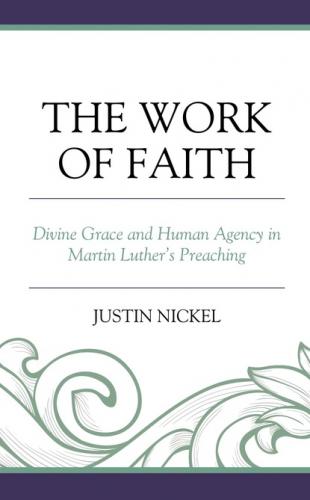15.
This is a frequent rhetorical move of both Bayer and Paulson. They suggest that any attempt to argue with their readings of Luther is finally only an attempt to make Luther more palatable to modern sensibilities. The intended impact is clear: agree with them or betray Luther, and with him the gospel. For instance, Bayer, Luther’s Theology, pp. 1–12; Paulson, pp. 5–17.
16.
Fred Meuser, “Luther as Preacher of the Word of God,” McKim, Donald K. ed. The Cambridge Companion to Martin Luther (Cambridge, UK: Cambridge University Press, 2006), p. 136.
17.
Meuser, p. 136.
18.
Martin Brecht, Martin Luther: 1521–1532: Shaping and Defining the Reformation, v. II (Minneapolis, MN: Fortress Press, 1993). p. 284.
19.
Richard Lischer, “Luther and Contemporary Preaching: Narrative and Anthropology," Scottish Journal of Theology, 36 (Fall 1983): 487.
20.
Lischer, p. 487.
21.
Lischer, p. 487.
22.
John M. Frymire, The Primacy of the Postils: Catholics, Protestants, and the Dissemination of Ideas in Early Modern Germany, v. 147 (Boston: Brill, 2010), p. 1.
23.
LW 75: xxv.
24.
LW 77: xx.
25.
LW 77: xx.
26.
LW 75: xxix.
27.
As found in John Nicholas Lenker, ed. Sermons of Martin Luther: The Church Postils (Grand Rapids, MI: Baker Books, 1996).
28.
Further still, there is good precedent for treating these sort of texts as authentically Luther’s. Indeed, two recent studies on Luther’s Genesis Lectures—1545 offer this precedent. Much like the sermons in question, these were lectures delivered by Luther and transcribed by his students. Like the sermons, Luther also endorses them as his own work and provides a preface suggesting as much. Unlike the sermons, however, the lectures have gone through a series of scholarly debates regarding their authenticity as Luther’s works. That they have been so vindicated only offers further support for my use of the sermons. My thanks to Miles Hopgood for the following references. See: John A. Maxfield, Luther’s Lectures on Genesis and the Formation of Evangelical Identity (Kirksville, MO: Truman State University Press, 2008), pp. 1–9; Mickey Leland Mattox, Defender of the Most Holy Matriarchs: Martin Luther’s Interpretation of the Women of Genesis in the Enarrationes in Genesin, 1535-45, Studies in Medieval and Reformation Thought, v. 92 (Boston: Brill, 2003), pp. 259–275. The Church Postil, then, is made up of sermons that run from Advent to Pentecost in the Church Calendar. My own analysis will focus on sermons from the season of Epiphany through Pentecost. These are found in LW: 76–77. For more on the byzantine publishing history of the Church Postil, See Benjamin Mayes, “Introduction to the Luther-Cruciger Church Postil (1540-1544)” in LW 75: xiii–xxxi and “Introduction to Volume 77” in LW 77:xiii–xxiii.
29.
Mayes, “Introduction to the Luther-Cruciger Church Postil (1540–1544),” p. xiii.
30.
Mayes, p. xiii. For my purposes, this claim’s import lies not in Frymire’s description of Luther’s Germany as “early modern,” but rather in the importance of the postil’s genre.
31.
Frymire, p. 28. See also, Edward A. Engelbrecht, Friends of the Law: Luther’s Use of the Law for the Christian Life (St. Louis, MO: Concordia Publishing House, 2011), pp. 164–166.
32.
Mayes, xiii.
33.
Mayes, xiii. For a chart with more detail numbers, see Frymire, p. 558.
34.
Frymire, p. 29.
35.
Frymire, p. 29.
36.
Frymire, p. 29. The point here is not to argue for Luther’s understanding of the household and the gender roles it assumes, but rather to show the influence and spread of the postils. I take it for granted that women can and do run households just as well as men.
37.
Here, I assume Helmer’s argument regarding the importance of genre for Luther’s writing. In her study on Luther and the Trinity, she notes that “the genre that presents the subject matter shapes the language Luther uses to convey, explain and interpret trinitarian dogma.” I follow this insight, even as my interests are in the moral life rather than the doctrine of the Trinity. See Christine Helmer, The Trinity and Martin Luther: A Study on the Relationship between Genre, Language and the Trinity in Luther’s Works, 1523–1546 (Mainz, Germany: P. von Zabern, 1999), p. 1.
38.
Mary Gaebler, The Courage of Faith: Martin Luther and the Theonomous Self (Studies in Lutheran History and Theology. Minneapolis, MN: Fortress Press, 2013); Michael Richard Laffin, The Promise of Martin Luther’s Political Theology: Freeing Luther from the Modern Political Narrative (T&T Clark Enquiries in Theological Ethics, New York: Bloomsbury T&T Clark, 2016).
Конец ознакомительного фрагмента.
Текст предоставлен ООО «ЛитРес».
Прочитайте эту книгу целиком, купив полную легальную версию на ЛитРес.
Безопасно оплатить книгу можно банковской картой Visa, MasterCard, Maestro, со счета мобильного телефона, с платежного терминала, в салоне МТС или Связной, через PayPal, WebMoney, Яндекс.Деньги, QIWI Кошелек, бонусными картами или другим удобным Вам способом.
